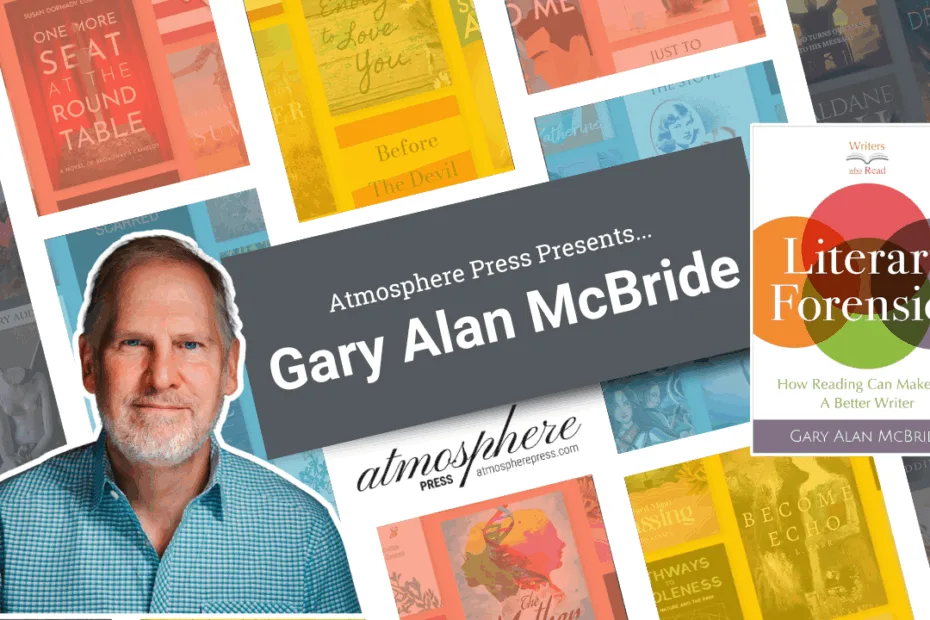An Interview with Gary Alan McBride

Gary Alan McBride is the producer and host of Writers Who Read, a podcast about how to read like a writer, and he is also the founder and facilitator of the Boulder-based Literary Forensics study group of the same name that has analyzed over seventy novels published since 2017. Gary is a fourth-generation Denverite who has traveled extensively for work and pleasure, living for over a decade in Europe and Southeast Asia.
Who/what made you want to write? Was there a particular person, or particular writers/works/art forms that influenced you?
I can’t identify the origin of my desire to write—it’s something more primal, like an appetite I’ve always known. I am transported by narrative, whether it’s a novel by Faulkner or a movie by Kubrick or an opera by Puccini, and that fantastic storyland I go to in my head is a magical place I’ve never wanted to leave. Writing puts me in a similar flow state, and once I discovered I could do that, it was like taking the best drug ever.
What inspired you to start writing this book?
The intelligent and knowledgeable people attracted to my Boulder-based Writers Who Read novel study group have given me so much encouragement over the years, especially during the early going, back in 2018, when I was still trying to figure everything out. One of my members told me that she learned more from my group than she did studying for her PhD, and it was she who said, “You really ought to write a book.” Another member said, “You should present this at writing conferences,” and it was at my first conference that I found my agent. I wouldn’t have embarked on this journey without Writers Who Read.
Tell us the story of your book’s title. Was it easy to find, or did it take forever?
It came pretty easily, actually. I chose Literary Forensics fully expecting you to think of CSI-style crime investigation. Just as the forensic investigator can determine how the murder was committed from a mere drop of blood and a carpet fiber, so too we study the novel in front of us, and from the smallest of clues—a word, a context, a gap—we can determine how it was created and came to be in the shape we find it.
If your book had a soundtrack, what are some songs that would be on it?
Sorry, I can’t listen to music and hope to do anything other than listen to music. Music fills my head so completely that I don’t know how other writers do it. However, in the spirit of the novel-cocktail pairings we do on my Writers Who Read podcast, my book does have its own cocktail: the Boulevardier. It’s a whiskey-based Negroni invented in Paris in the 1920s and the name means ‘man-about-town.’ I like the sophistication that implies. It’s also delicious.
What other professions have you worked in? What’s something about you that your readers wouldn’t know?
I worked as a professional musician for over ten years. Learning how to master the piano (and all other keyboards—get it?) provided me with a number of life lessons that I use to this day, especially when I need to address a creative question in any field. I’m also something of a data wonk from my time as a data scientist, and I have this deep appreciation for any and all words, in whatever language they appear. Language is the most fascinating data set I know, encompassing everything from rhythm, music, emotions, culture, spectacle, and the structure of the very stories by which we live our lives.
What books did you read (for research or comfort) throughout your writing process?
Once I realized the width and breadth of what I was trying to assemble between the covers, I started to familiarize myself with hermeneutics and literary theory, epistemological philosophy, social psychology, cultural anthropology, discourse and narrative analysis, pedagogy, dramaturgy, linguistics, semiotics, and close, distant, and critical reading. I read dozens of books and consulted hundreds of websites to ensure that what I was presenting was both factual and contained the latest scholarship. There was no single book that guided me, of course, because what I was compiling represented a compendium of so many different disciplines. I will, however, name three books that I returned to time and again: Poetics by Aristotle(it’s all there!), How to do Discourse Analysis by Paul Gee, and How Learning Works by Marsha Lovett, et al.
What advice would you give your past self at the start of your writing journey?
Leave the gun. Take the cannoli.
What’s one thing you hope sticks with readers after they finish your book?
I think all of us acknowledge that English fluency alone doesn’t make you a good writer. There’s a real skill to writing well that most of us don’t possess. I’m hoping that my book gets everyone to realize that learning to read well also requires study. That just because you can read these words it doesn’t necessarily follow that you’re getting everything you can out of the text, and that there’s always more to learn about writing from analyzing any book.
Are you a writer, too? Submit your manuscript to Atmosphere Press.

Atmosphere Press is a selective hybrid publisher founded in 2015 on the principles of Honesty, Transparency, Professionalism, Kindness, and Making Your Book Awesome. Our books have won dozens of awards and sold tens of thousands of copies. If you’re interested in learning more, or seeking publication for your own work, please explore the links below.
